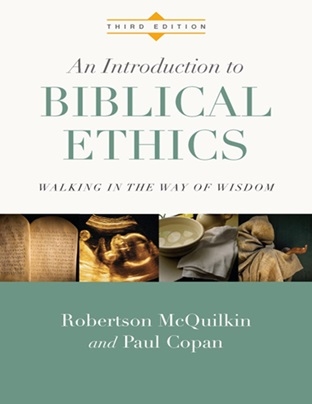
McQuilkin - Copan - An Introduction to Biblical Ethics - модуль BibleQuote
Robertson McQuilkin and Paul Copan - An Introduction to Biblical Ethics - Walking in the Way of Wisdom
Third Edition. – Downers Grove, IL: InterVarsity Press, 2014. – 669 p.
ISBN 0830828184
Columbia International University president emeritus, Robertson McQuilkin, wrote An Introduction to Biblical Ethics, which was first published by Tyndale in 1989. This book has had a good run over the course of two editions, and it has been translated into a number of languages, including Korean, German and Amharic. Twenty-eight years ago, I (Paul) had read this non-published manuscript by McQuilkin as a textbook in his class at what is now Columbia International University. This book made a remarkable impact on me and helped guide my thinking on many ethical questions.
Roberston McQuilkin and I stayed in contact over the years, writing to each other and visiting with one another from time to time. In June 2009, “Mr. McQuilkin” (as I still call him), wrote an email to me, requesting my advice. Hoping to extend the life of the book, he asked about a possible coauthor to revise the book with him. In his note, he said that his objective in conceiving and writing this ethics book was not merely that it be true to Scripture; he wanted to actually start with Scripture to deal with ethical issues in the Bible itself as well as with contemporary ethical issues in light of Scripture, structuring his work around the Ten Commandments. However, he was skeptical that he could find an ethicist willing to revise the book with him and whom he could fully endorse.
So I wrote back to him, informing him that his book had been a marvelous resource to me over the years. I mentioned that I taught ethics, of which he was unaware. In somewhat parallel fashion, I myself had written a philosophy of religion book, Loving Wisdom: Christian Philosophy of Religion (Chalice), which had the identical goal: to begin with and extensively engage the Scriptures to articulate and defend philosophically the coherence of the Christian metanarrative (God, creation, fall, redemption, re-creation). Having the same vision as he, I expressed a willingness to go in with him on this project.
He immediately replied: “if you do ethics, too, I can think of no one I’d rather bequeath this project to! I think the book has had a unique niche and, from what you say, still could. Maybe my query to you was a ‘God-thing’!”
This book has required updating and expansion in places. We have added material on topics ranging from utilitarianism and evolutionary ethics to gay marriage to bioethical issues such as plastic surgery, transsexualism and surrogate motherhood. Obviously, this book is an expression of agreement between the authors regarding much material on biblical ethics. A few differences remain, as will be evident, but it has been a joy to engage in discussion. In various portions of the book, you will see “McQuilkin’s Perspective” and “Copan’s Perspective” headings. We consider this feature of the book to be a virtue: it shows a range of acceptable views within evangelicalism and that people who disagree at secondary points can still work together beneficially and amicably.
* * *
Suicide
Suicide as a sin. Hemlock Society founder Derek Humphry wrote a 1991 bestseller, Final Exit, subtitled The Practicalities of Self-Deliverance and Assisted Suicide for the Dying. Though written for those terminally ill and seeking “quiet release,” this type of book could “assist” the hundreds of thousands of teenagers who “fail” in their suicide attempts. If a person is master of his fate, why not expand the possibility of suicide to the physically healthy but despairing in mind? In his book Humphry writes, “If you consider God the master of your fate, read no further. Seek the best pain management available and arrange hospice care.”1
Suicide is wrong because it violates the prohibition of intentionally taking innocent human life. It is nowhere condoned in Scripture either directly or by implication. Nevertheless, difficult problems inhere in this prohibition and seem to cluster around two opposite poles. At one pole, is suicide so light a sin, so unlike murder, that attempted suicide should go unpunished? At the other extreme, is successful suicide an unpardonable sin?
How wrong is suicide? There is tension between two biblical principles. Believers are not the owners of their bodies, and the same is true for unbelievers—life is a gift from God, whether one acknowledges God or not. Furthermore, the believer’s body is the home—the temple—of God himself. So suicide is very serious—a violation of our creation and redemption. On the other hand, our lives belong to us in a sense that others’ lives do not, so that violence to our own body would seem to be less a sin than violence to another’s body.
How bad a sin is suicide? No matter how we may seek to excuse suicide, it is a sin requiring repentance and God’s forgiveness. The act of suicide is not against oneself alone. Others are affected, often tragically. Many times this is the deliberate intent. Yet suicide may well reveal a failure of the community to care for the desperately needy in its midst.
However, no matter how serious a sin, it is certainly forgivable, as any other sin. The difference between this sin and most others is that for other sins there is normally a period of grace following the sin to permit repentance. Repentance is necessary to restore fellowship broken through sin (1 Jn 1:8). Yet theologians who believe one’s salvation can never be lost—and those who believe it can be—typically deny that a single sin would forfeit salvation. Would a Christian, suddenly enraged and suffering a heart attack, go to meet God unforgiven? Is anger in such circumstances an unpardonable sin? No, a suicide of one of God’s children, though “crashing uninvited” into God’s presence, is not unpardonable to the Father because of One who deliberately gave his own life to forgive all of our sins (Col 2:13).
Suicide as a crime. Suicide is clearly a sin, violating God’s law, but American society does not treat it as a crime—those who attempt suicide are not prosecuted as attempted murderers. Neither do we punish people who deceive themselves, who destroy or waste their own possessions. We may think them misguided or sick, but not criminal, as would be the case if they did these things to others. The government has a responsibility to protect against the taking of innocent human life, but since suicide has not been treated as a crime, it may be difficult to punish those who assist others’ suicides.
Even so, assisting with suicide should not be decriminalized. This involves the intentional taking of another innocent human life. Throughout history, doctors swearing by the ancient Hippocratic Oath have vowed, “I will neither give a deadly drug to anybody if asked for it, nor will I make the suggestion to this effect.” This oath stood in opposition to abortion as well. The vocation of doctors is to help, not harm—to heal, not annihilate. They promise not to kill even when asked to do so. It is not compassionate to take another’s life when asked—no more so than if a doctor complied when asked by his patient to have sex with him because she was lonely and needy.
The practice of medicine requires personal confidentiality and profound trust. And if a doctor is legally permitted to kill, how could any patient entrust herself to him? As Stanley Hauerwas writes, “It may be that the demand for euthanasia comes because we lack the skills humanely to know how to be with and care for the dying. . . . Humans never kill more readily than when we kill in the name of mercy.”2 Often “mercy” at the end of life springs not from compassion but from inconvenience. Though we do not seek suffering, we must recognize that we cannot insulate ourselves from it or from the suffering who need our compassion. This means caring for those who cannot care for themselves, refusing to give up on those who themselves feel like giving up.
Self-sacrifice. Self-sacrificially laying down one’s life for another is not sinful suicide. If it were, God himself would be the guiltiest. No one took Christ’s life from him. He laid it down of his own volition (Jn 10:18). In fact, “Greater love has no man than this, that a man lay down his life for his friends” (Jn 15:13 RSV). Far from being the worst of crimes, it is the greatest of virtues. The mother allowing herself to starve in order to feed her children, the friend leaving another with the life jacket and swimming off into the night—these are heroes, not sinners.
Refusing medical care. Another form of self-chosen death that can hardly be considered sinful or criminal is refusing necessary medical attention—foolish, perhaps, but not sinful. We do not agree with those who think that using medicine is wrong—that it is a sign of unbelief. That said, it would be very difficult, on biblical grounds, to condemn as sinful or criminal those who choose “the way of faith.” The Bible is full of promises about God’s healing power, even if incidental passages show a lower regard for medical procedures (e.g., Mk 5:26). And Paul himself advises Timothy to take wine for his stomach’s sake (1 Tim 5:23).
Throughout Scripture, we see instances of trusting in God’s deliverance from death or sickness—although with an assumption that while God can readily heal or deliver, he is not obligated to: “He will deliver us out of your hand, O king. But even if He does not . . .” (Dan 3:17-18). Yet we also see sickness as an inevitable part of a fallen world (2 Cor 12:7-10; Phil 2:26-27; 1 Tim 5:23; 2 Tim 4:20; Jas 5:14-15). This is not the place to present scriptural evidence that medical help is not only legitimate, but a gift of God; indeed, it is part of God’s common grace to humankind. However, we must grant liberty to those who interpret Scripture to mean that the way of faith precludes medical help.
One final word concerning the ethics of suicide. Often in the life of the victim of suicide there are those who deliberately or through insensitivity helped create an environment that the suicidal person eventually judged to be intolerable. In the final analysis, though, a person is responsible for her own choices; the family and friends of the victim cannot bear the guilt of that person’s choice. Repentance may be needed for whatever real or imagined complicity may exist, but to continue to bear a burden of guilt is to deny the grace of God.





Комментарии
Пока нет комментариев. Будьте первым!